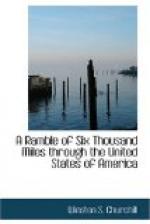On arriving at Cincinnati, I learned that my friend T—— had taken up his abode at a farm-house a few miles from town, where I accordingly repaired, and found him in good health, and initiated into all the manners, habits, customs, and diversions of the natives. Farming people in Ohio work hard. The women have no sinecures, being occupied the greater part of the day in cooking; as they breakfast at eight, dine at half-past twelve, and sup at six, and at each of these meals, meat, and other cooked dishes are served up. In farming they co-operate with each other. When a farmer wishes to have his corn husked, he rides round to his neighbours and informs them of his intention. An invitation of this kind was once given in my presence. The farmer entered the house, sat down, and after the customary compliments were passed, in the usual laconic style, the following dialogue took place. “I guess I’ll husk my corn to-morrow afternoon.”—“You’ve a mighty heap this year.”—“Considerable of corn.” The host at length said, “Well, I guess we’ll be along”—and the matter was arranged. All these gatherings are under the denomination of “frolics”—such as “corn-husking frolic,” “apple-cutting frolic,” “quilting frolic,” &c.
Being somewhat curious in respect to national amusements, I attended a “corn-husking frolic” in the neighbourhood of Cincinnati. The corn was heaped up into a sort of hillock close by the granary, on which the young “Ohiohians” and “buck-eyes”—the lasses of Ohio are called “buck-eyes”—seated themselves in pairs; while the old wives, and old farmers were posted around, doing little, but talking much. Now the laws of “corn-husking frolics” ordain, that for each red ear that a youth finds, he is entitled to exact a kiss from his partner. There were two or three young Irishmen in the group, and I could observe the rogues kissing half-a-dozen times on the same red ears. Each of them laid a red-ear close by him, and after every two or three he’d husk, up he’d hold the redoubtable red-ear to the astonished eyes of the giggling lass who sate beside him, and most unrelentingly inflict the penalty. The “gude wives” marvelled much at the unprecedented number of red-ears which that lot of corn contained: by-and-by, they thought it “a kind of curious” that the Irishmen should find so many of them—at length, the cheat was discovered, amidst roars of laughter. The old farmers said the lads were “wide awake,” and the “buck-eyes” declared that there was no being up to the plaguy Irishmen “no how,” for they were always sure to have every thing their own way. But the mischief of it was, the young Americans took the hint, and the poor “buck-eyes” got nothing like fair play for the remainder of that evening. All agreed that there was more laughing, and more kissing done at that, than had been known at any corn-husking frolic since “the Declaration.”




